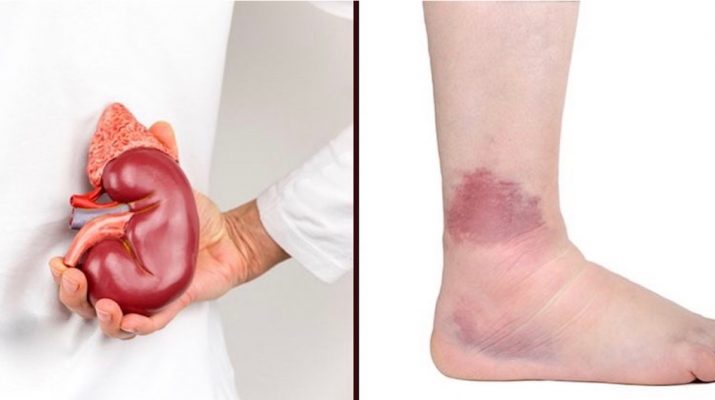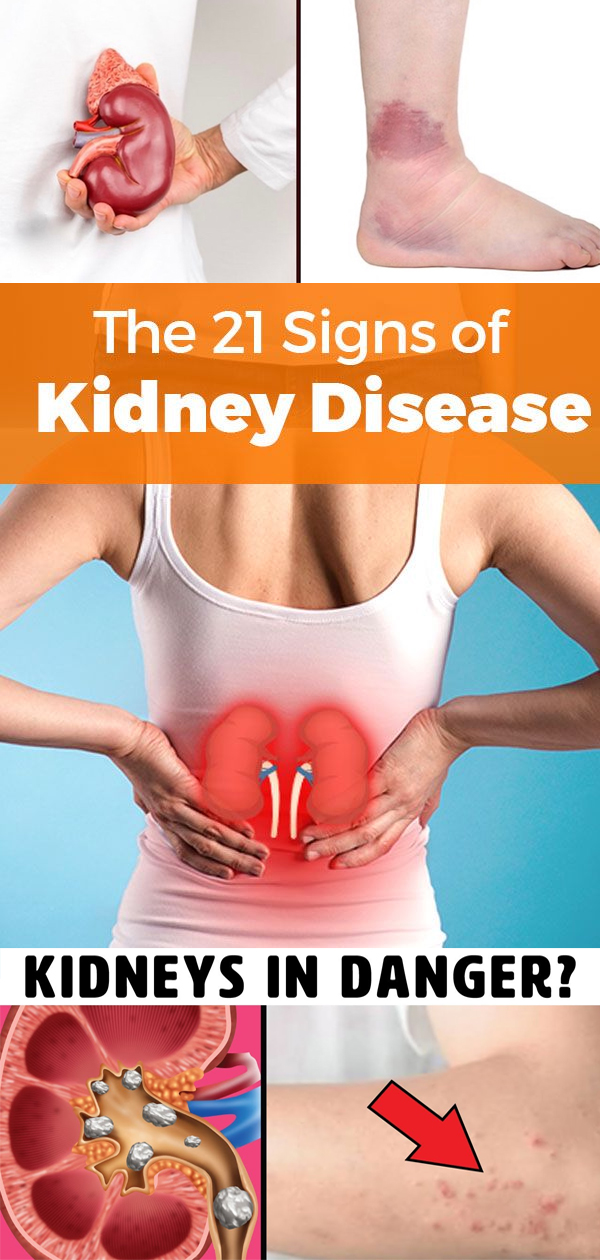Chronic kidney disease is the gradual loss of kidney function, which eventually leads to permanent kidney failure. Kidney-related issues are more common that we are aware of, and they often go undiagnosed since their symptoms are not easy to detect.
As the kidney failure advances, and the function of the kidney is impaired, fluid and waste accumulate in the body, so the aim of the treatment is to slow down this progression.
The American Kidney Fund explains:
“If your kidneys stop working suddenly (acute kidney failure), you may notice one or more of the following symptoms:
Having one or more of any of the symptoms above may be a sign of serious kidney problems. If you notice any of these symptoms, you should contact your doctor right away.”
If one of the kidneys stops functioning, the other can perform its normal function, but this usually occurs when the disease is well advanced, and the damage is irreversible.
Therefore, early detection is essential in the prevention of serious kidney disease. These are the most common symptoms and signs of chronic kidney disease:
- more frequent urination, especially at night
- panting (shortness of breath)
- protein in urine
- a sudden change in body weight
- anemia
- blood in urine
- dark urine
- Poor mental alertness
- Reduced urine output
- male inability to get or maintain an erection (erectile dysfunction)
- nausea
- edema – swollen feet, hands, and ankles
- fatigue and/or trouble sleeping
- muscle cramps
- muscle twitches
- hypertension (high blood pressure)
- insomnia
- itchy skin
- loss of appetite
- pain on the side or mid to lower back
- unexplained headaches
Chronic Kidney Disease Causes
The role of the kidneys is to filter or blood from excess waste and fluids and excrete them from the body. According to Web MD:
“Healthy kidneys:
- Keep a balance of water and minerals (such as sodium, potassium, and phosphorus) in your blood
- Remove waste from your blood after digestion, muscle activity, and exposure to chemicals or medications
- Make renin, which your body uses to help manage your blood pressure
- Make a chemical called erythropoietin, which prompts your body to make red blood cells
- Make an active form of vitamin D, needed for bone health and other things”
In case the blood flow to the kidneys is somehow impaired, if the urine outflow is obstructed, or one suffers from some disease or damage, they cannot function normally, and this causes serious issues.
Progressive kidney damage is most often caused by chronic disease (a long-term disease), like:
- Kidney diseases – such as polycystic kidney disease, pyelonephritis, or glomerulonephritis.
- Kidney artery stenosis – This occurs when the renal artery narrows or is blocked before it enters the kidney.
- Injury – a sharp blow or physical injury to the kidney(s).
- Diabetes – chronic kidney disease is linked to diabetes types 1 and 2.
- Obstructed urine flow – The flow of the urine can be blocked as a result of an enlarged prostate, kidney stones, or a tumor.
- Certain toxins – including fuels, lead, and solvents
- Hypertension (high blood pressure)
- Fetal developmental problem
- Systemic lupus erythematosus
- Malaria and yellow fever
- Medications – overuse of, for example, NSAIDs, like aspirin or ibuprofen.
- Illegal substance abuse – like heroin or cocaine.
The following conditions or situations increase the risk of developing kidney disease:
- diabetes
- hypertension
- a family history of kidney disease
- age – chronic kidney disease is much more common in people older than 60
- atherosclerosis
- congenital kidney disease (kidney disease which is present at birth)
- lupus erythematosus
- overexposure to some toxins
- bladder obstruction
- chronic glomerulonephritis
- sickle cell disease
- some medications
Chronic Kidney Disease Diagnosis
A doctor can diagnose chronic kidney disease by checking the symptoms and signs, and performing the following tests:
Blood test – Persistently high levels of urea and creatinine indicate end-stage kidney disease.
Urine test – It will detect the presence of protein or blood in the urine.
Kidney biopsy – Doctors examine a small sample of kidney tissue for cell damage.
Chest X-ray – the check for pulmonary edema
Kidney scans – These scans check if there are any blockages in the flow of the urine, and may include a magnetic resonance imaging (MRI) scan, computed tomography (CT) scan, or an ultrasound scan.
Glomerular filtration rate (GFR) – It compares the levels of waste products in the patient’s blood and urine and measures how many milliliters of waste the kidneys can filter per minute.
Changes in the GFR rate can indicate the stage of kidney disease. In most countries, the stages are classified as explained below:
Stage 1 – Normal GFR rate, but evidence of kidney disease has been detected.
Stage 2 – GFR rate is lower than 90 milliliters, and evidence of kidney disease has been detected.
Stage 3 – GFR rate is lower than 60 milliliters, regardless of whether evidence of kidney disease has been detected.
Stage 4 – GRF rate is lower than 30 milliliters, regardless of whether evidence of kidney disease has been detected.
Stage 5 – GFR rate is lower than 15 milliliters. Renal failure has occurred.
Chronic Kidney Disease Treatment
Currently, there is no cure for chronic kidney disease, but there are successful therapies that effectively control the symptoms and signs, and slow the progression of the disease.
Chronic kidney disease patients need to take numerous medications. Treatments include:
High blood pressure
High blood pressure is common in the case of chronic kidney disease, so in order to protect the kidneys, one needs to lower it.
Anemia treatment
A patient develops anemia when the levels of hemoglobin are now. These patients need blood transfusions, as well as iron supplements, either in the form of daily ferrous sulfate tablets, or injections.
Phosphate balance
In the case of kidney disease, the body cannot eliminate phosphate properly. Therefore, patients should lower their intake of phosphate, and avoid foods like eggs, fish, dairy products, and red meat.
Fluid retention
Most patients are asked to restrict their fluid intake, in order to prevent additional fluid buildup in the body.
Skin itching
To soothe the itching, patients usually take antihistamines, like chlorphenamine. NSAIDs (nonsteroidal anti-inflammatory drugs) Patients should take NSAIDs only if a doctor recommends them.
Vitamin D
The vitamin D levels are lower in patients with kidney disease, and it is essential for healthy bones. Therefore, patients are advised to take alfacalcidol or calcitriol.
Anti-sickness medications
To relieve nausea which occurs as a result of the toxic buildup in the body, patients are given medications like cyclizine or metoclopramide.
Diet
To treat kidney failure, the patient needs to follow a healthy diet, low in protein and salt, and restricted intake of foods rich in potassium and phosphorus. The DASH diet is a recognized treatment for hypertension, heart disease, and kidney disease.
The National Kidney Foundation recommends the DASH diet, “which can slow the progression of both heart disease and kidney disease. If you already have chronic kidney disease, you should speak with your doctor and dietitian before starting any new diets as you may have special restrictions to consider.
The DASH diet should not be used by people on dialysis. Individuals on dialysis have special dietary needs that should be discussed with a registered dietitian.”
End-Stage Kidney Disease Treatment
The American Kidney Fund claims:
“Most people with chronic kidney disease will be able to control their condition with medication and regular check-ups. Chronic kidney disease only progresses to kidney failure in around 1 in 50 people with the condition.
But if you have chronic kidney disease, even if it’s mild, you’re at an increased risk of developing other serious problems, such as cardiovascular disease. This is a group of conditions affecting the heart and blood vessels, which includes heart attacks and strokes.
Cardiovascular disease is one of the main causes of death in people with kidney disease, although healthy lifestyle changes and medication can help reduce your risk of developing it.”
When the kidneys are functioning at less than 10-15 percent of normal capacity, these measures are not enough, and the patient needs dialysis or a kidney transplant in order to survive.
Kidney Dialysis
Dialysis is the elimination of waste products and excessive fluids from blood when the kidneys fail to do so. It can be of two types, and peritoneal dialysis.
In the case of hemodialysis, blood is pumped out of the body and goes through a dialyzer. The sessions last for about 3 hours, three times a week.
In peritoneal dialysis, blood is filtered in the patient’s own abdomen; in the peritoneal cavity. A catheter is inserted into the abdomen, into which a dialysis solution is infused and drained out for as long as is necessary.
Kidney Transplant
For people who do not suffer from any other condition than kidney failure, a kidney transplant is a better alternative. To lower the risk of rejection of the new kidney, the kidney donor and recipient should have the same blood type, cell-surface proteins, and antibodies.
Complications of Chronic Kidney Disease
If chronic kidney disease progresses to kidney failure, patients can experience the following complications:
- Weak immune system
- anemia
- insomnia
- lower sex drive
- male erectile dysfunction
- central nervous system damage
- hyperkalemia – blood potassium levels rise, which can result in heart damage
- osteomalacia – bones become weak and break easily
- pericarditis – the sac-like membrane that envelops the heart (pericardium) becomes inflamed
- stomach ulcers
- dry skin
- fluid retention
In order to prevent chronic kidney disease, one should:
— control the chronic conditions that can raise the risk of chronic kidney disease
— follow a diet rich in fruits, vegetables, whole grains, fish, and lean meat
— exercise regularly in order to control blood pressure and chronic conditions like heart disease and diabetes
— avoid alcohol and drugs, and long-term exposure to heavy metals, solvents, and fuels
As a conclusion, have the following important facts about chronic kidney disease in mind, listed by the National Kidney Foundation:
- 30 million American adults have chronic kidney disease and millions of others are at increased risk.
- Early detection can help prevent the progression of kidney disease to kidney failure.
- Heart disease is the major cause of death for all people with CHRONIC KIDNEY DISEASE.
- Glomerular filtration rate (GFR) is the best estimate of kidney function.
- Hypertension causes chronic kidney disease and chronic kidney disease causes hypertension.
- Persistent proteinuria (protein in the urine) means chronic kidney disease is present.
- High-risk groups include those with diabetes, hypertension and family history of kidney failure.
- African Americans, Hispanics, Pacific Islanders, American Indians, and Seniors are at increased risk.
- Two simple tests can detect chronic kidney disease: blood pressure, urine albumin and serum creatinine.


